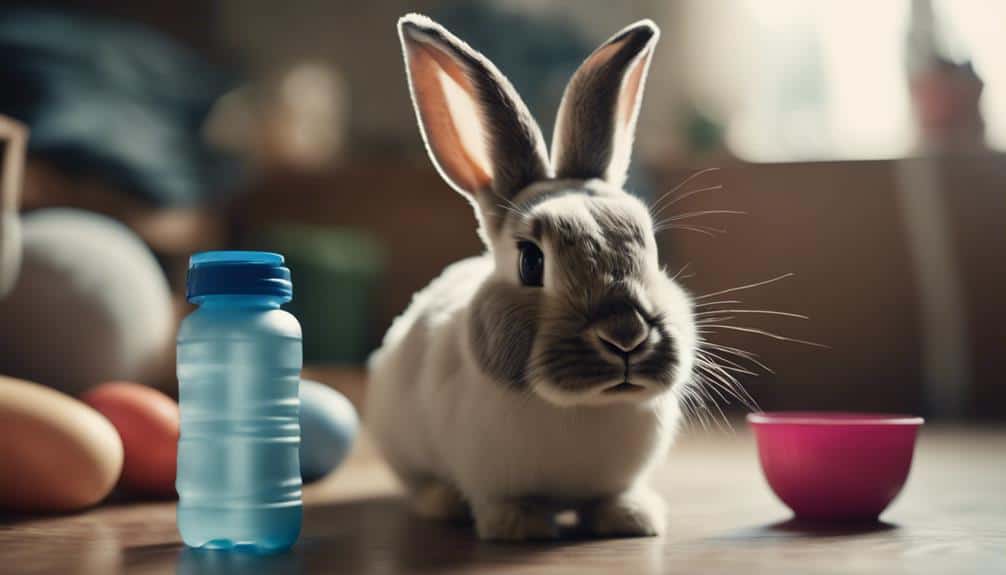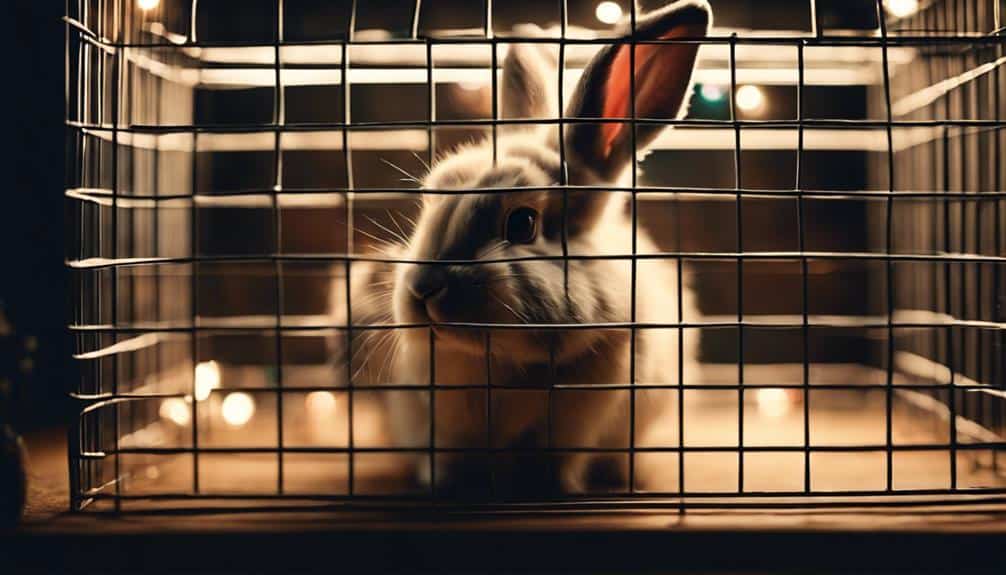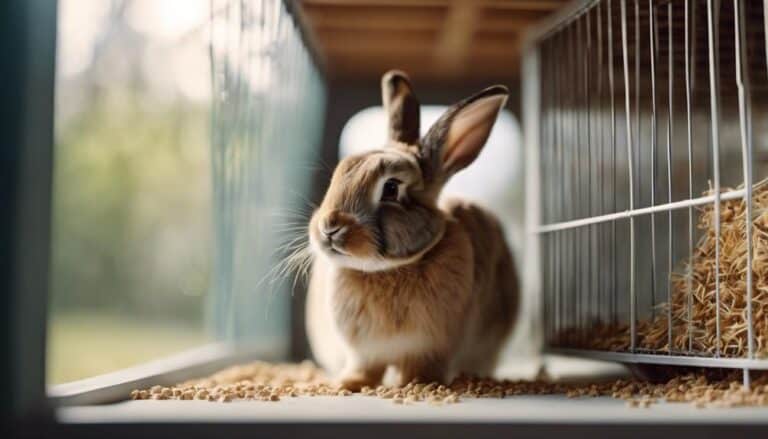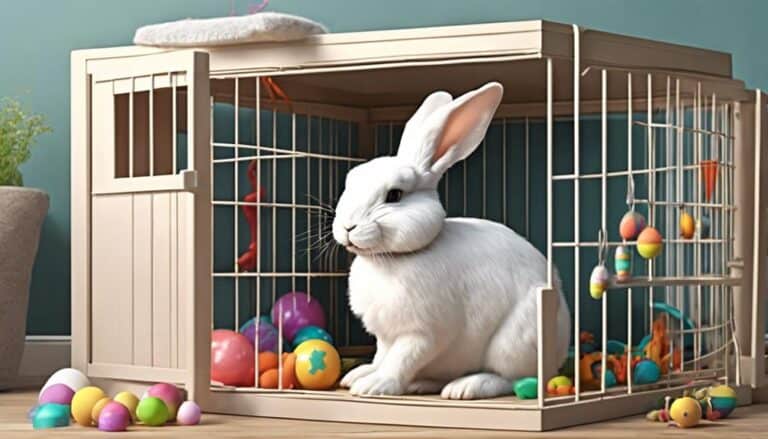If your bunny seems less active than usual, it's time to investigate. There are many reasons why your bunny might not be moving around much, and it's essential to figure out what's going on.
Sometimes, gastrointestinal problems can make your bunny feel pretty crummy, leading to a decrease in activity. Other health problems, like arthritis or injuries, can also make it painful or difficult for your bunny to move around.
But it's not just health issues. Environmental stressors can also play a role. For example, if your bunny is feeling anxious or scared, it might not want to venture out of its comfort zone. Even changes in its surroundings, like a new pet or person in the house, can cause your bunny to feel uneasy and less active.
Start by observing your bunny's behavior and looking for any signs of illness or injury. Make sure its environment is safe and comfortable, and try to reduce any stressors that might be affecting it. By being proactive and making a few adjustments, you can help your bunny feel more comfortable and get it moving again.
Contents
Key Takeaways
So, you're wondering why your bunny isn't moving around much? There are a few possible reasons for this.
For one, gastrointestinal stasis, dental issues, or illness can all cause your rabbit to slow down. If your bunny's not feeling well, they're not going to want to hop around like they normally do.
Changes in your bunny's environment, like a new diet or a move to a new home, can also affect their activity level. And let's not forget about stress – if your bunny's feeling anxious or overwhelmed, they might not be as active as they usually are.
Some other possible causes of reduced movement in rabbits include respiratory infections and arthritis. These can be pretty painful, so it's no wonder your bunny might not want to move around much.
On the other hand, if your bunny's living space is comfortable and spacious, with proper temperature and ventilation, they're more likely to be active and happy.
If you're concerned about your bunny's inactivity, it's always a good idea to consult with a vet. They can help you figure out what's going on and get your bunny back to their usual self. So, if you notice your bunny's not moving much, not eating, or producing abnormal stool, don't hesitate to reach out to a vet for advice.
Common Causes of Reduced Bunny Movement

If your bunny isn't moving around as much as they used to, there are several reasons that could be behind this change.
One possible cause is gastrointestinal (GI) stasis, a condition where the digestive system slows down or stops working correctly. This can lead to lethargy and reduced activity.
Another potential reason is dental disease, which can cause pain and discomfort for rabbits. When they're in pain, they're less likely to want to move around.
Illnesses like respiratory infections or arthritis can also affect a rabbit's movement, as they may be experiencing pain or discomfort.
Even changes in their diet or environment can stress out your bunny, leading to decreased appetite and movement.
Health Issues Impacting Rabbit Activity
If you’ve noticed your rabbit isn’t as active as they used to be, it’s time to consider some potential health issues that might be causing the problem. It’s important to observe any other changes in behavior, such as reduced appetite or hiding more often than usual. These could be signs of discomfort or illness that require immediate attention. Understanding why rabbits run towards you can also help gauge their emotional state—if they seem to be seeking your presence, it may indicate they need reassurance or support during a difficult time.
One serious condition that can make rabbits lethargic is gastrointestinal (GI) stasis. This is when their digestive system slows down or stops working altogether.
Changes in your rabbit's eating habits can be a sign of GI stasis. For example, if they suddenly start eating less or show no interest in food, it could be a red flag. Other symptoms to watch out for include bloating, hunching, and a lack of fecal pellets.
If your rabbit seems unusually lethargic and isn't moving around as much as usual, don't hesitate to take them to the vet. Lethargy can be a sign of underlying health issues that need professional attention.
A vet can assess your rabbit's symptoms, run some tests, and provide the right treatment to get them back to their normal active self. If you're worried about your rabbit's health, don't delay seeking medical help.
Environmental Factors Affecting Bunny Mobility

Environmental factors have a huge impact on a bunny's mobility and overall well-being.
To keep your rabbit active and healthy, you need to consider a few things.
First, think about their home environment. Rabbits need space to move around and hide, so make sure their living area is spacious and has plenty of hiding spots. This will help reduce stress and encourage them to get moving.
Next, you need to think about the temperature, humidity, and air quality in their environment. Rabbits are most comfortable when the temperature is between 60°F to 70°F (15°C to 21°C) and humidity levels are at 50% to 60%. This will keep them feeling comfortable and active.
Consulting a Veterinarian for Bunny Inactivity
If you notice your bunny is being inactive, not moving, eating, or producing stool for a while, don't hesitate to take them to the vet right away. This could be a sign of a medical emergency, especially if your rabbit hasn't moved, eaten, or had a bowel movement for more than 6-8 hours.
The vet can figure out what's going on and diagnose problems like GI stasis, respiratory infections, or dental issues that might be making your rabbit lethargic. They'll do a physical exam, check their medical history, and might do some tests like X-rays or an ultrasound to find the root cause.
The vet can then provide supportive care, like feeding them through a syringe, and prescribe meds if needed. It's crucial to get your bunny to the vet early on to prevent complications and help them get better.
Solutions to Encourage Bunny Movement

To promote your bunny's activity levels, make sure their living space is equipped with a variety of stimulating toys and regularly rotate them to encourage movement and exploration.
First and foremost, you need to ensure a safe and comfortable living space for your rabbit. This means creating an environment with ample room to move around freely, which helps reduce stress and promotes physical activity.
A balanced diet is also crucial. You should provide a diet rich in fiber and limited in high-calorie foods to maintain a healthy weight and support mobility in your bunny. A healthy diet is essential for overall well-being and mobility.
Setting up a bunny agility course is also a great idea. Create a fun and engaging course with tunnels, ramps, and obstacles to provide mental and physical stimulation for your rabbit. This encourages exercise and keeps your bunny active and healthy.
Conclusion
If your bunny isn't moving around much, it's a good idea to figure out why. Sometimes, a bunny that's not very active can be a sign of health problems or stress.
Make sure to keep a close eye on your bunny's behavior and watch for any signs that might be worrying.
If you're concerned, it's always best to consult a veterinarian.
A happy and healthy bunny is usually an active one, so if you notice any issues that might be affecting their mobility, take steps to address them.






